Festivals - Frightfest 2 23 : Thorns : Let’s talk with director Douglas Schulze and Doug Bradley
By Mulder, USA / Angleterre / France, 21 august 2023
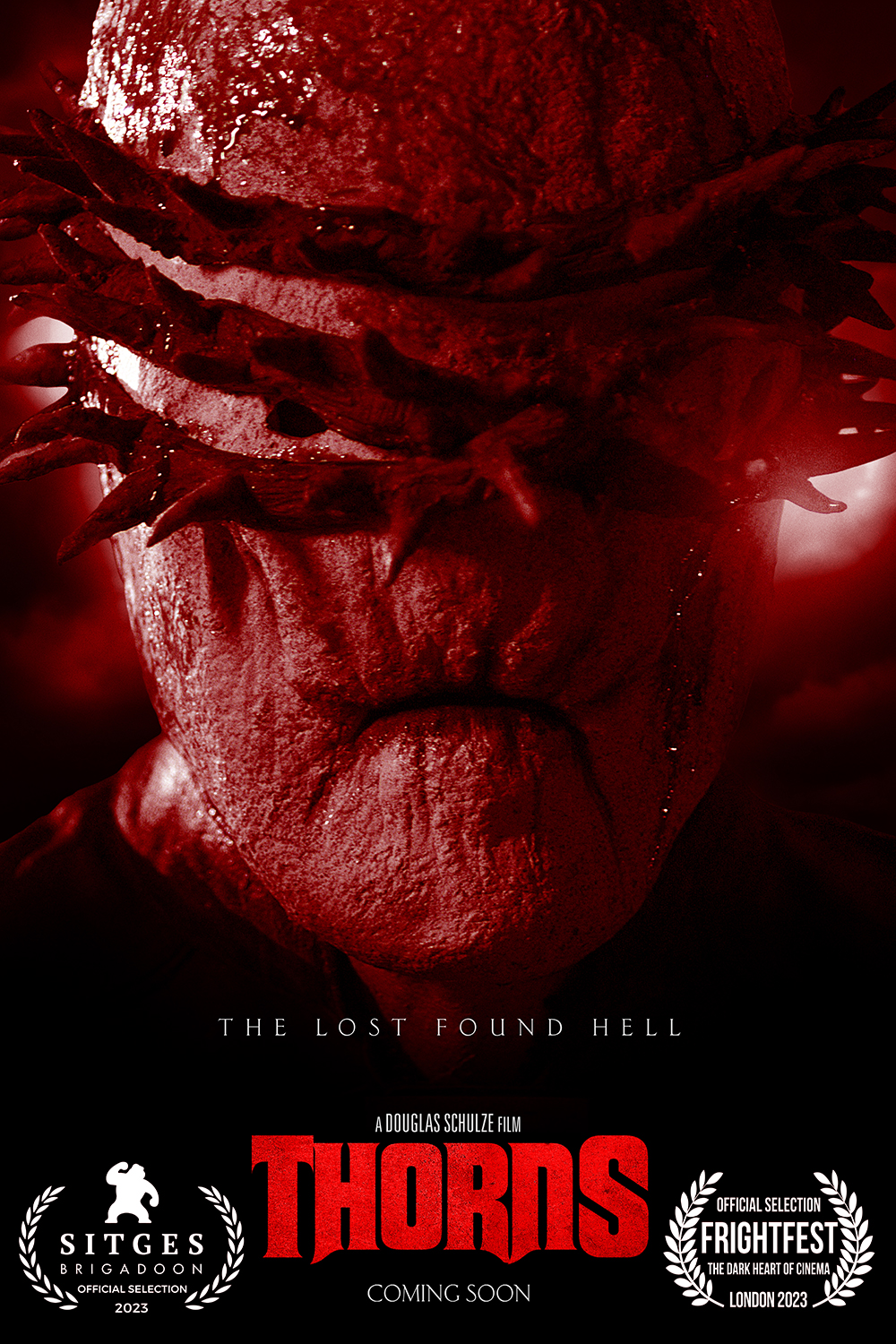
Prepare to descend into the depths of terror as filmmaker Douglas Schulze unveils his latest creation, the independent horror film Thorn. Schulze, known for such achievements as The Dark Below, Hellmaster and Mimesis Nosferatu, has created a tribute to the era of classic horror.
At the heart of Thorns is a captivating nod to the horrific iconography of yesteryear. The legendary Doug Bradley, forever etched in the minds of horror fans thanks to his role as Pinhead in Hellraiser, once again appears on screen, bringing to life a character that evokes the spirit of that iconic franchise. Although Thorn is not directly linked to the Hellraiser saga, it is a heartfelt tribute to the legacy that Bradley helped forge in horror cinema.
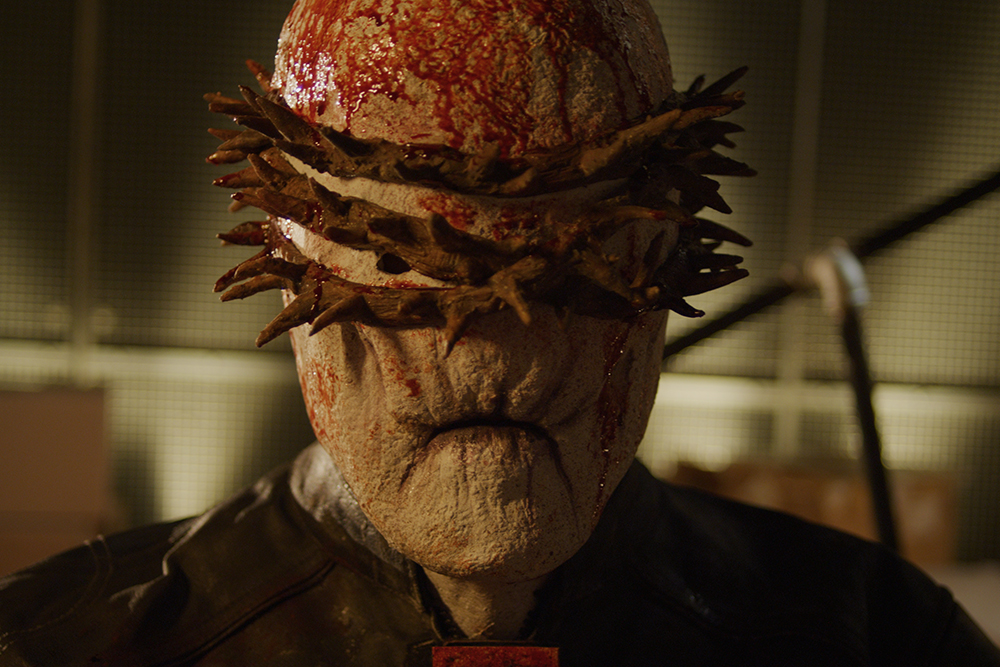
The premise of Thorns is a seductive blend of science fiction and the supernatural, wrapped in the trappings of an '80s monster movie. A former priest, now employed by NASA, embarks on a harrowing mission to investigate a remote observatory that has gone eerily silent after receiving a cryptic radio transmission from deep space. Upon his arrival, an unspeakable terror is unleashed: a thorny monster, a nightmare creature that takes shape thanks to masterful make-up effects. Faced with a global cataclysm, the former priest must rekindle his lost faith to thwart the signal that could trigger the end of the world.
Douglas Schulze reveals his creative vision: Thorns interweaves the themes of religion and science against a backdrop of classic 80s horror aesthetics. Drawing on such cinematic milestones as John Carpenter's The Thing, Ridley Scott's Alien, William Friedkin's The Exorcist and Clive Barker's Hellraiser, the film pays homage to the golden age of horror, a time when practical effects and visceral gore reigned supreme.
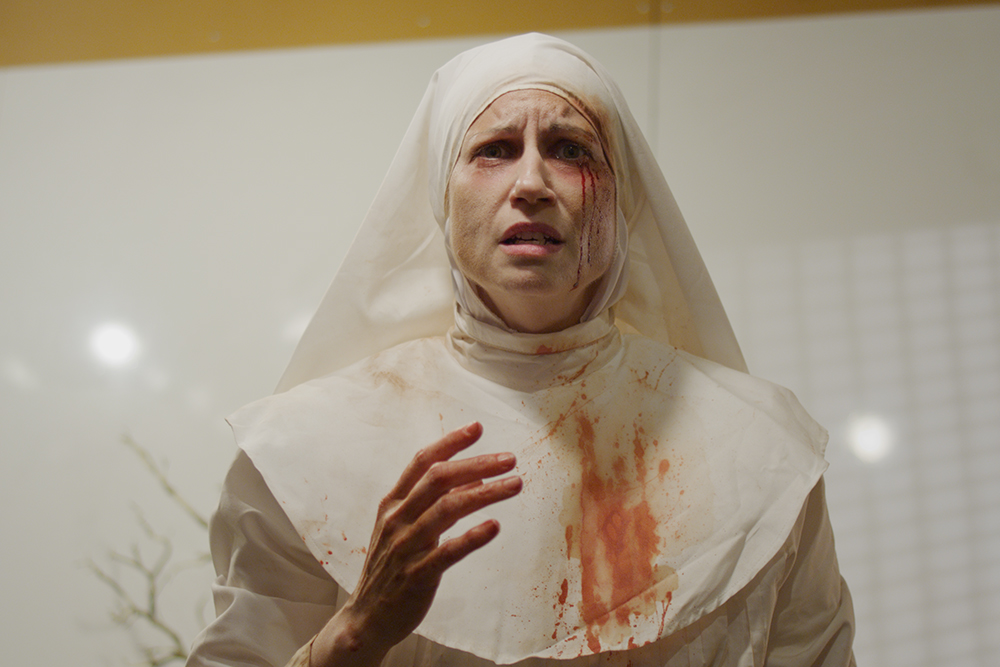
For those craving a genuine dose of horror nostalgia, Thorns is a highly anticipated film. With the enigmatic Doug Bradley in the role of a mysterious archbishop, the film hints at chilling depths that only this seasoned master of horror can fathom. Thorns is set to captivate audiences with its fusion of timeless horrific themes and cutting-edge practical effects. Schulze's willingness to write a love letter to the genre's illustrious past, while creating a fresh and captivating narrative, guarantees that Thorns will be a significant addition to the horror cinema pantheon.
As part of the Frightfest festival where Thorns will be screened, which opens this Thursday, we interviewed director Douglas Schulze and iconic actor Doug Bradley. Thorns will be screened this Saturday August 26 at 8.30pm, and we strongly recommend it.
Q : Thorns draws inspiration from horror classics like Hellraiser The Thing and The Exorcist. How did you balance paying homage to these iconic films while still creating a unique and original story ?
Douglas Schulze : Wonderful question! It's certainly a challenge to pay homage to our favorite classics from the 70s and 80s. Thorns draws a lot of inspiration from the fantastic classic monster movies of that era. The idea behind it was to create a monster film that heavily relies on practical effects. I believe we successfully achieved this goal, and hopefully, audiences will agree.
Q : Doug Bradley, you've played roles in various horror subgenres. What do you find particularly compelling about religious horror, and how does it differ from other types of horror you've been a part of ?
Doug Bradley : So, you're specifically asking about religious horror. Well, it's quite intriguing, and I believe it's a fascinating question, especially for those currently working in the horror genre. Religion has always been intertwined with horror in some way. The fundamental aspects of horror—life, death, resurrection, flesh, blood, spirits, souls, salvation, damnation, evil, and good—all contribute to the essence of horror. These themes are present whether or not religion is directly involved. Interestingly, they are also inherent to religious narratives.
For someone like me who isn't a believer, exploring religious horror presents a unique challenge. Recently, I portrayed an Archbishop in a film titled 'The Exorcists,' and I followed that by playing an exorcist. While I personally don't hold beliefs in the devil or demonic possession, delving into these themes is remarkably entertaining. It's liberating to engage with these concepts, even though my own convictions differ. As for the distinction between the two, I must admit I'm not entirely certain. However, ‘Thorns draws inspiration from various sources, particularly the ideas, language, and apocalyptic imagery found in the Book of Revelation. The presence of the Archbishop character, coupled with the notion of the church's involvement in space exploration, creates an intriguing dynamic. This exploration of both the church's world and the realm of science within ‘Thorns adds a unique layer. Doug has done an exceptional job in the screenplay, skillfully weaving these two elements together

Q : The film features a mysterious radio signal from deep space that triggers the biblical end of times. How did you approach blending scientific concepts with religious themes to create a cohesive and engaging narrative ?
Douglas Schulze : Hopefully, we have succeeded in evoking the desired emotions in audiences, you know, to make them feel that we've accomplished our goal. The initial feedback indicates that the success has been achieved. Therefore, the concept of merging science and religion has consistently fascinated explorers. If I'm understanding your question correctly, I believe the foundation of the film originated from a horror story, and the idea of examining religious aspects through a scientific lens proved to be both intriguing and captivating. While we have witnessed numerous biblical films and stories centered around Earth, delving into the cosmos captivates me in terms of how various denominations and religious traditions, extending beyond just the Catholic faith, could potentially integrate elements of science and outer space into their belief systems. So, I hope I have adequately addressed your question.
Q : The character of Archbishop Jenkins seems to be morally complex. Doug, Can you delve deeper into his motivations and the internal conflicts he faces throughout the story ?
Doug Bradley : He's deliberately presented in a very ambiguous manner, which I assume is intentional and something that attracted me to the character. As I mentioned before, the concept of portraying an Archbishop within the church, particularly in the film's early scenes where he's introduced straightforwardly as an Archbishop of the Catholic Church, who has been brought in by the space agency to handle or at least advise on the situation involving the enigmatic signals from the rogue space station. Unfortunately, these signals have led to dire consequences. The film does not offer clarity, and this ambiguity is reinforced by the fact that we never witness Archbishop Jenkins outside of his defined context. Although there's a scene where he's inside a confessional box, his location and operational base remain undisclosed. We're left pondering whether he's affiliated with a specific church, whether he operates from the Vatican, or whether he's positioned in the United States, England, or even Rome. It's even conceivable that he might not truly be an Archbishop but is posing as one. All these options pose valid questions without definitive answers. Regarding the script, I found myself grappling with similar queries, yet the answers remained elusive. Consequently, the most fitting course of action seemed to be maintaining the ambiguity. In some respects, this situation isn't entirely dissimilar to my experience with Pinhead, a character devoid of a name or background. Unlike that scenario, where I lacked any external reference, I have some familiarity, whether direct or indirect, with archbishops, ministers, priests, and their roles within the church. However, in the case of a character like Pinhead, all I had to rely on was my imagination and the script. A parallel can be drawn to the strength of Pinhead in 'Hellraiser.' Despite being verbose about who the Cenobites are—angels to some, demons to others, explorers of the further realms—the descriptions provide little insight. Similarly, in Thorns Doug has managed to evoke this enigmatic quality. Audiences will undoubtedly find themselves questioning the nature of the character throughout the film. Is he truly an Archbishop? What's the underlying truth? These queries will linger even as the credits roll, devoid of concrete answers. Personally, I appreciate this directorial choice

Q : Practical effects and makeup play a significant role in Thorns. Could you share some memorable moments or challenges from the set related to creating these practical effects and bringing the film's visual elements to life ?
Douglas Schulze: Regarding the practical effects, I collaborated with a gentleman named Dan Phillips and his team. We had the task of working with actor Bo Schumacher, who did a remarkable job portraying the creature in this film. Bo had the challenge of wearing heavy prosthetic makeup for his role. Our creature, affectionately referred to as The Necronaut, required Bo to be entirely covered in the makeup. Unfortunately, once immersed, Bo had no visibility due to the makeup, and he could breathe through two small slits in the mask. Consequently, the actor needed assistance to navigate from the makeup chair to the filming location. Throughout, he grappled with disorientation and an overwhelming sense of claustrophobia caused by the full makeup.
To note, Bo Schumacher holds the credit of being a licensed scuba diver, and he likened the experience to being underwater and feeling similarly claustrophobic due to restricted breathing. Whenever we transitioned Bo to the sets, our primary focus shifted to filming scenes involving the actor in the monster makeup. This was a delicate balance and a significant challenge for him, yet he persevered admirably, even enduring instances where he wore the makeup for eight to ten hours.
Doug Bradley: I have a question for Doug, as I'm unsure of the answer myself. Was the makeup like a mask that could be lifted off in one piece, or was it composed of separate pieces applied and affixed in place?
Douglas Schulze: Certainly, it wasn't a mask that could be easily removed. The makeup was constructed as a whole piece. Due to budget constraints, the situation was quite challenging for the actor. I can't thank Bo enough for his dedication. I anticipated that at some point he might need to remove the makeup due to the discomfort it caused, but he persevered admirably.
Doug Bradley: He did an excellent job. He's a part of the Union, isn't he ?
Douglas Schulze: Yes, he's indeed a member of the Union.
Q : Doug , You've been a part of the Hellraiser franchise for years. How did your involvement with the series influence your perspective on horror cinema and storytelling particularly on this movie Thorns ?
Doug Bradley : I'm not sure if Hellraiser accomplished either of those objectives, to be completely honest. As I've often mentioned, I was a horror film enthusiast even before I aspired to be an actor. When I did pursue acting, it wasn't necessarily driven by the expectation or ambition to work within the genre. However, due to my fondness for literature and fiction, my focus has always been on the story itself. This holds true for horror films, science fiction movies, thrillers, love stories, comedies, and nearly all genres, although there are exceptions that we needn't delve into at this moment. What always matters most is the narrative—the story. That's what I seek whenever I'm presented with a script. My initial consideration is whether the story is compelling. Would I be eager to flip the page and uncover what unfolds next? Would I be inclined to watch this film? Additionally, I assess whether the character is intriguing. Does the character manage to captivate me, particularly in relation to the narrative? These two aspects—story and character—are consistently what guide my evaluations. In the case of Thorns, I believe Doug successfully met both criteria to my satisfaction. Upon reading the screenplay, I was immediately drawn in by the story's grip and captivated by the enigmatic Archbishop character.
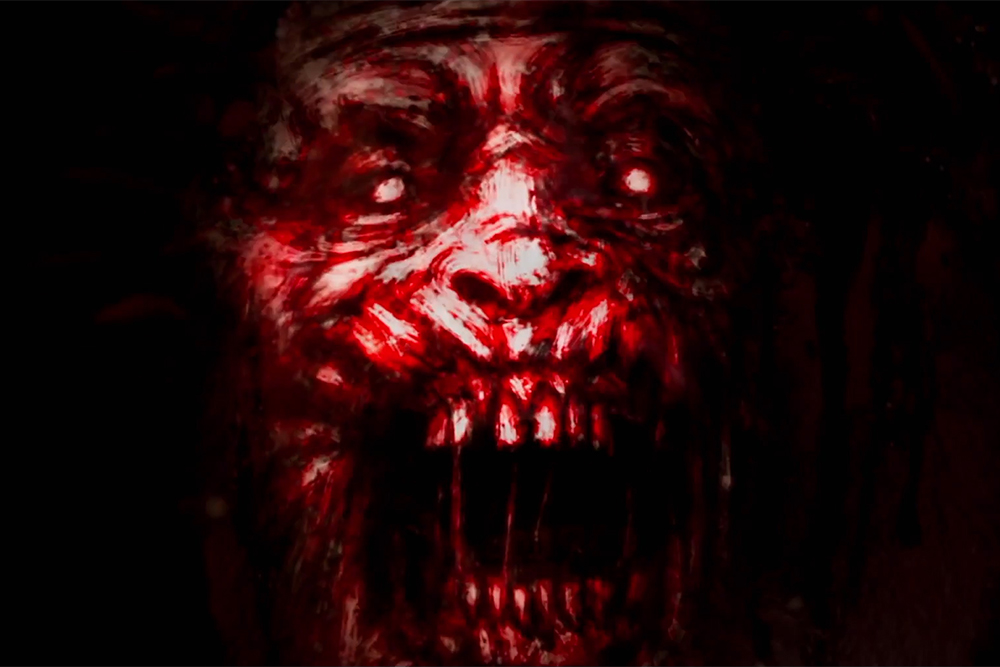
Q : The film's atmosphere seems to harken back to the '80s horror aesthetic. How did you recreate that nostalgic feeling while still maintaining a contemporary and relevant storyline ?
Douglas Schulze : A great question. What's intriguing is how I describe the film: a modern-day monster movie with a distinct retro vibe. When considering it, I looked back to a time of ongoing fascination with religion and science. The subject matter of our story is both contemporary and captivating. This perspective enabled me to step into the realm of homage, particularly in art direction and production design—two areas I am truly passionate about in filmmaking. This is where the fun came in. We collaborated with two art directors to create an ambiance that evokes the late 70s and early 80s. When you step inside the Mountaintop Observatory, my aim was for you to feel transported back to that era. That was our guiding principle in our discussions. We meticulously worked on the lighting, set dressings, and even the choice of lenses, all intended to capture the retro essence of the story. However, it was essential that the film also possess a modern sound and meet contemporary horror standards. When it comes to the horror scenes, they had to embody the expectations of modern horror, even though we were incorporating practical effects and a natural red palette. Striking the right balance was paramount. Hopefully, we've achieved that equilibrium, providing an experience that resonates with audiences.
Q : Doug, As an actor, author, and narrator, you've worked on a variety of projects. Could you share your process of transitioning between different mediums and genres, such as horror films, music, and literature ?
Doug Bradley : Well, you're very kind to label me as a writer, but I wouldn't exactly categorize myself as one. I'm primarily an actor who happened to write a book. I believe there's a significant difference between that and actually being a writer. Additionally, I've never taken on a directorial role, so I must decline to answer that question
Q : Thorns tackles themes of faith and belief, particularly through the ex-priest protagonist. How did you approach exploring these themes in the context of a horror narrative?
Douglas Schulze : I believe the character of an ex-priest inherently prepares you for unsettling content, so to speak. A man grappling with troubled spiritual beliefs becomes an ideal figure to place at the center of an apocalyptic narrative. The concept initially took shape as a means to convey an apocalyptic tale. The very origins of the evil in the story actually trace back to a book I read many years ago, 'The Hope for Healing Human Evil.' Once the foundation of the narrative was established, revolving around the exploration of a mysterious signal and the subsequent need for investigation, the notion emerged that this character could be a former priest. This character, now working for a space agency, fascinated me. It was as if he had been searching for answers on Earth without success and had now shifted his focus to the cosmos in the hopes of finding those elusive answers. However, all along, I believe the answers were within him, metaphorically hinting at what's to unfold in the story. I hope this adequately addresses your question
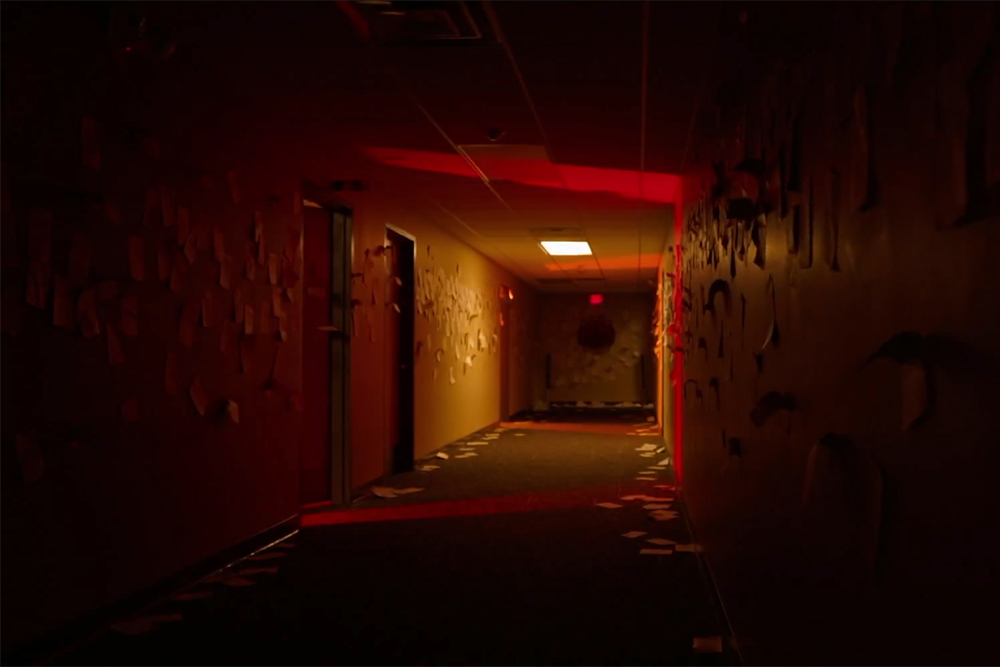
Q : The title Thorns underwent a change from its original title Necronaut. Can you elaborate on the decision behind this change and how the new title better represents the film's content and themes ?
Douglas Schulze : I believe the title Thorns is a perfect fit for the film. However, I also appreciate our previous title for the film. This title resonates with the essence of the film and it resonated with me as we crafted the character of the monster. The way I envisioned the monster, it served as a metaphor for the inner struggles within each of us. Given this perspective, I felt that the film's title should reflect these underlying themes. As a result, I found it more fitting to name the film Thorns
Q : Religious horror often delves into deeper philosophical and existential questions. In what ways does Thorns explore these themes, and how do they contribute to the overall horror experience ?
Doug Bradley : Well, I mean, Thorns is clearly a case where we tend to categorize things into neat boxes like horror films or different genres within cinema. In my mind, after reading the script and giving it my approval, it stands out as an Apocalypse movie. It's essentially a retelling of the apocalypse story. Within that overarching narrative, it delves into various ideas, particularly those related to evil and the specific quest, as Archbishop Jenkins puts it, to understand what evil is. He mentions that the oldest trick played on humanity is making us believe that hell is a distinct place somewhere out there, when in reality, it's within our own minds and present right here and now. I believe that, in a way, all of horror deals with this fundamental aspect. The core elements of horror—life, death, blood, resurrection, evil, damnation, salvation, murder, destruction—are all tied to the human condition. These are the building blocks not only of horror but also of religion. Religion is deeply entwined with these same concepts of life and death, salvation, and damnation. However, religion also deeply engages with notions of the body, flesh, sexuality, and the physical nature of our existence. It grapples with whether to embrace these aspects or, as many religions tend to do, reject and attempt to distance and control them. Yet, these are things that ultimately cannot be distanced or controlled
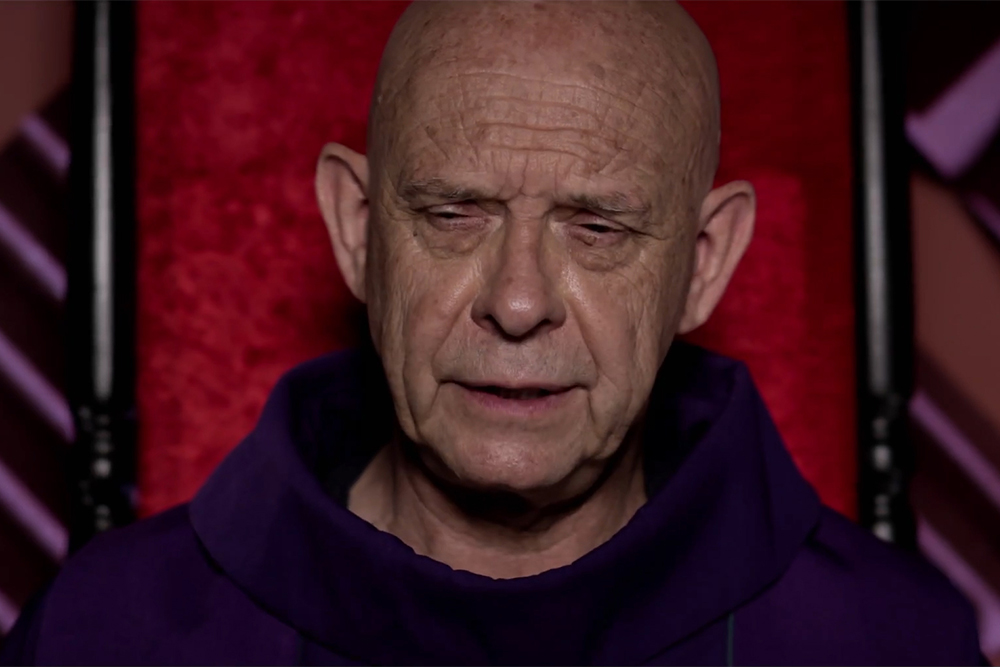
Q : Thorn is premiering at FrightFest. How do you feel about the film's debut and its potential reception among dedicated horror enthusiasts ?
Douglas Schulze : Oh, well, of course, I'm honored that we were invited to screen our film in London. We decided to make it our world premiere due to the festival's history and the other wonderful films that have premiered there. We're extremely honored and humbled by the invitation. We're looking forward to representing the film there and having the opportunity to experience London for the first time
Q : Doug, You've created a YouTube channel where you read books and poems aloud. What inspired you to start this channel, and how do you select the material you read?
Doug Bradley : It really started during lockdown, and actually, part of the inspiration came from Patrick Stewart, who began reading all of Shakespeare's sonnets one a day in a very informal manner. It was just him with a book, reading. This is something I've always done; I've been reading aloud since an early age, and I still continue to do so. I suppose it's a part of an innate impulse. So, I decided to do something similar. I began with a serialization of Mary Shelley's 'Frankenstein.' I wanted to approach it in the same relaxed way, as if I were reading it aloud from the bookshelf right behind me. I sit in an armchair with the book in hand, and none of it is edited; it's all live. If I make a mistake, I acknowledge it and move forward. The goal was to capture that feeling of me personally reading you a story. I must admit I've become somewhat lax recently in keeping up with it, and I chastise myself for it. I have a long list of content I want to cover, and I really should get back to it. Regarding the second part of your question, I read what I enjoy
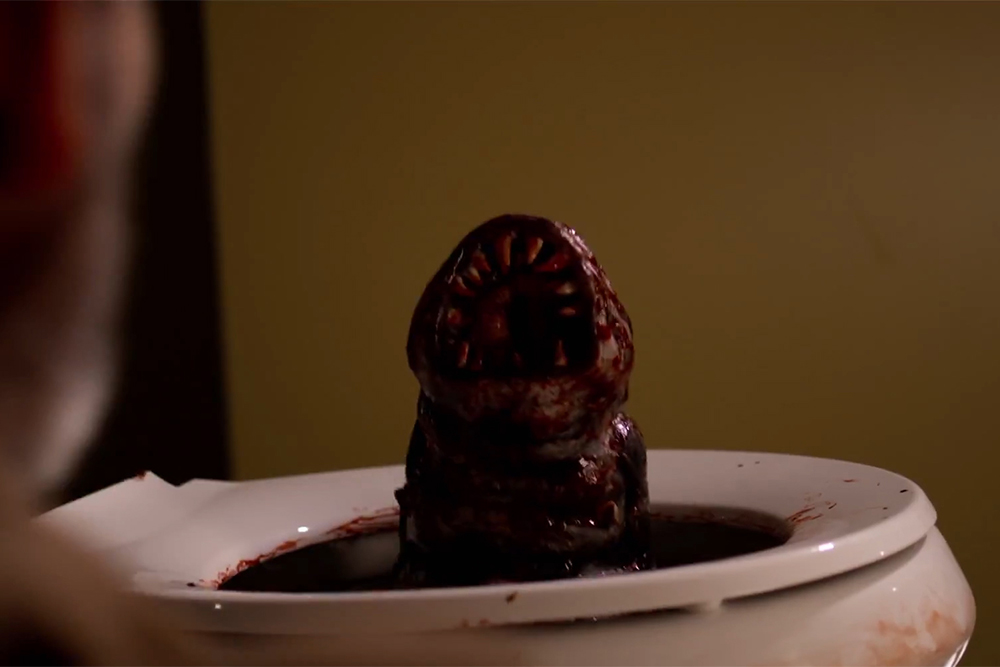
Q : Can you tell us some words about are your upcoming projects ?
Doug Bradley: Well, since working on Thorns I've also done voice-over work for an animated series called 'The Invincible,' set to premiere on Amazon early next year. Although, perhaps I shouldn't discuss it in detail as it was a SAG project. Additionally, I portrayed a priest in a film titled 'The Exorcists' for Asylum. Moving forward, I'm scheduled to work on an independent movie shooting in Ohio next month. The film is titled 'Thy Will Be Done,' and I'll be portraying a police captain, a character with an interesting connection to the church.
Douglas Schulze: Naturally, filmmakers often have numerous projects in the works. In today's world, it's possible to create movies even using your phone, though quality isn't guaranteed. I'm currently developing a new project. Moreover, I have contemplated a sequel idea for Thorns though its realization will depend on the reception of the film. Beyond that, I have a concept that leans more towards the realm of bio-horror, exploring different subject matter. On average, there tends to be a few years between projects due to the way funding comes together and various factors influencing the production timeline.

Synopsis:
A former priest working for NASA is sent to investigate a remote observatory that went silent after receiving a radio signal from deep space. He discovers that this signal has triggered the end of biblical times.
Thorns
Written and directed by Douglas Schulze
Produced by Julie Schulze, Kurt Eli Mayry, Douglas Schulze
Starring Jon Bennett, Cassandra Schomer, Bo Shumaker, Doug Bradley, Terence Cover
Music by Douglas Schulze
Cinematography : Jack Chaney, Tom Chaney
Edited by Julie Schulze
Special Makeup FX : Daniel Phillips
Visual effects Matthew Jarjosa
Release date : August 26 2023 (Frigtfest)
Running time : 91 minutes
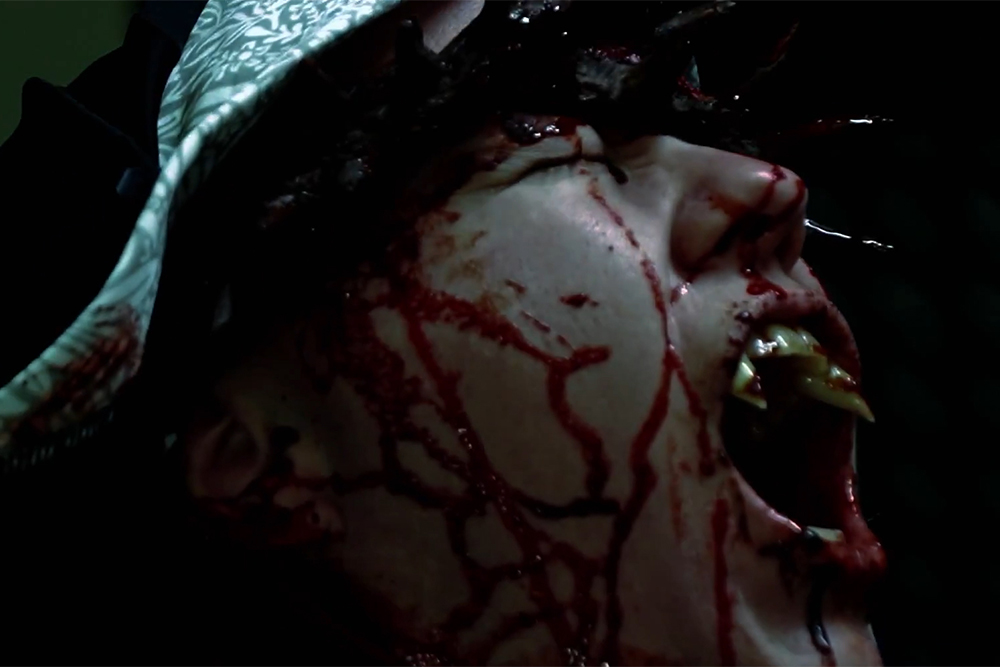
we'd like to thank Douglas Schulze and Doug Bradley for answering our questions.
A special thanks also to Tom Brumpton from Polymath PR

